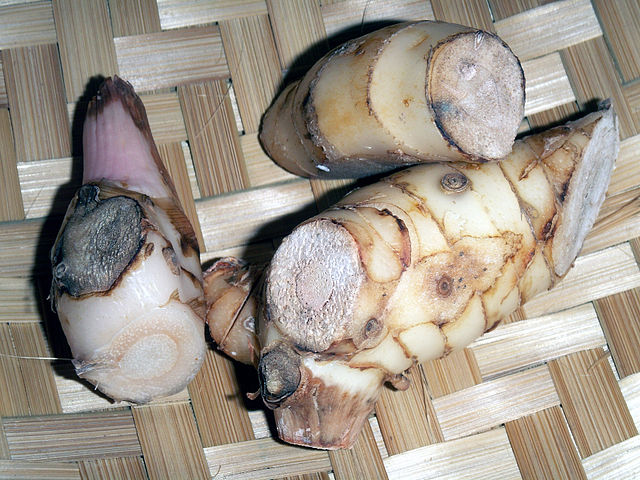Common Names and Other Names:
- Galangal
- Greater Galangal
- Thai Ginger
- Siamese Ginger
- Lengkuas (Malay/Indonesian)
- Kha (Thai)
- Rasna (in Ayurvedic medicine)
- Laos (in Indonesian cuisine)
Where Does It Occur:
Galangal (Alpinia galanga) is native to Southeast Asia, particularly:
- Indonesia
- Malaysia
- Thailand
- Vietnam
- Laos
- Cambodia
It is commonly cultivated in:
- India
- China
- Sri Lanka
Galangal thrives in tropical climates, preferring well-drained, fertile soils with partial shade. It is often found in:
- Rainforests
- Agricultural Fields
- Home Gardens
Basic Ingredients (Constituents):
Galangal contains several bioactive compounds contributing to its medicinal properties:
- Essential Oils:
- 1,8-Cineole
- α-Pinene
- β-Pinene
- Linalool
- Methyl Cinnamate
- Phenolic Compounds:
- Galangin
- Kaempferide
- Alpinin
- Quercetin
- Flavonoids
- Diarylheptanoids:
- Alpinol
- Alpinin
- Resins
- Tannins
These constituents provide galangal with antimicrobial, anti-inflammatory, antioxidant, and digestive stimulant properties.
Most Commonly Used For Treatment Of:
- Digestive Issues:
- Indigestion and Dyspepsia: Stimulates digestion and alleviates discomfort.
- Flatulence: Reduces gas and bloating.
- Stomach Pain: Soothes the gastrointestinal tract.
- Anti-inflammatory Effects:
- Arthritis and Rheumatism: Reduces inflammation and pain in joints.
- Muscle Aches: Alleviates soreness and stiffness.
- Respiratory Conditions:
- Coughs and Colds: Acts as an expectorant, helping to relieve congestion.
- Sore Throat: Soothes irritation.
- Antimicrobial Activity:
- Inhibits the growth of certain bacteria and fungi.
- Food Poisoning Prevention: Traditionally used to prevent spoilage and contamination.
- Immune System Support:
- Antioxidant Properties: Neutralizes free radicals, supporting overall health.
- Nausea Relief:
- Motion Sickness: May help reduce symptoms.
- Circulatory Health:
- Blood Circulation: Stimulates blood flow, warming the body.
Side Effects:
While galangal is generally safe when used in culinary amounts, potential side effects may include:
- Allergic Reactions:
- Skin Irritation: Rare cases of dermatitis when applied topically.
- Respiratory Symptoms: In sensitive individuals.
- Gastrointestinal Issues:
- Stomach Upset: In large doses, may cause abdominal discomfort.
- Heartburn: Due to its warming properties.
- Interaction with Medications:
- Anticoagulants: May enhance bleeding risk due to potential blood-thinning effects.
- Diabetes Medications: May affect blood sugar levels.
- Pregnancy and Breastfeeding:
- Use with Caution: Insufficient reliable information; consult a healthcare provider.
Available Forms in the Market:
- Fresh Rhizomes:
- Used in cooking and traditional remedies.
- Dried Galangal:
- Sliced or powdered form for culinary use.
- Capsules/Tablets:
- Contain powdered galangal for supplementation.
- Essential Oil:
- Used in aromatherapy and topical applications (must be diluted).
- Liquid Extracts and Tinctures:
- Alcohol-based extracts for internal use.
- Tea:
- Made from fresh or dried galangal slices.
- Topical Preparations:
- Creams or ointments containing galangal for external use.
Research and Results:
- Antimicrobial Activity:
- Study: “Antibacterial activity of Alpinia galanga against multidrug-resistant bacteria.”
- Findings: Demonstrated significant inhibitory effects against bacteria like Staphylococcus aureus and Escherichia coli.
- Reference: Journal of Ethnopharmacology
- Anti-inflammatory Effects:
- Study: “Anti-inflammatory properties of galangin extracted from Alpinia galanga.”
- Findings: Showed reduction in inflammation markers in animal models.
- Reference: Phytotherapy Research
- Antioxidant Properties:
- Study: “Antioxidant activity of Alpinia galanga extract.”
- Findings: Exhibited strong antioxidant activity due to phenolic compounds.
- Reference: Food Chemistry
- Digestive Health:
- Study: “Effects of Alpinia galanga on gastrointestinal motility.”
- Findings: Stimulated gastric emptying and improved digestion in animal studies.
- Reference: World Journal of Gastroenterology
- Anticancer Potential:
- Study: “Galangin induces apoptosis in cancer cells.”
- Findings: Indicated potential anticancer effects by promoting cell death in certain cancer cell lines.
- Reference: Cancer Letters
Note: While these studies are promising, most are preliminary or conducted in vitro or on animals. More clinical research on humans is needed to confirm efficacy.
Precautions:
- Pregnancy and Breastfeeding:
- Use with Caution: Consult a healthcare provider before use.
- Allergies:
- Zingiberaceae Family Sensitivity: Individuals allergic to ginger or turmeric should exercise caution.
- Medication Interactions:
- Anticoagulants (e.g., warfarin): May increase bleeding risk.
- Diabetes Medications: Monitor blood sugar levels, as galangal may lower glucose levels.
- Gastrointestinal Disorders:
- Ulcers or GERD: May exacerbate symptoms due to its stimulating effects.
- Children:
- Use with Caution: Not recommended for young children without professional guidance.
- Topical Use:
- Dilution Required: Essential oil should be diluted with a carrier oil to prevent skin irritation.
Conclusion:
Alpinia galanga, commonly known as galangal, is a spice and medicinal herb valued for its aromatic flavor and health benefits. It has been traditionally used in Asian medicine to aid digestion, reduce inflammation, and fight infections. Incorporating galangal into your diet or health regimen may offer various benefits, but it’s important to use it appropriately.
Recommendations:
- Culinary Use:
- Safe and beneficial when used as a spice in cooking.
- Consult a Healthcare Professional:
- Before using galangal for medicinal purposes, especially if you have underlying health conditions or are taking medications.
- Moderation:
- Use galangal in recommended amounts to minimize potential risks.
- Quality Assurance:
- Purchase products from reputable sources to ensure purity and safety.
Disclaimer:
This information is intended for educational purposes and should not replace professional medical advice. Always consult a qualified healthcare provider for personalized guidance before using galangal for medicinal purposes.
« Back to Glossary Index